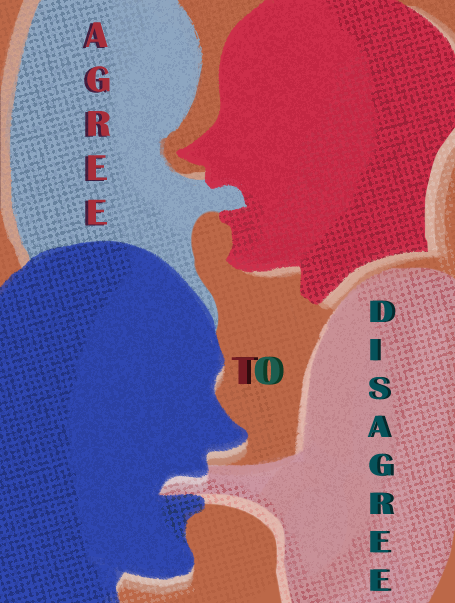The Art of Agreeing to Disagree
December 17, 2020
“I guess we’re going to have to agree to disagree.”
I don’t know about you, but whenever I hear this dropped in the middle of a heated argument or conversation, it leaves me fuming even more at the end. It’s like trying to cool down a wildfire with a cup of water; the feelings and emotions aren’t going to go away that fast.
As human beings, we love to give our opinions. Different opinions are what makes each of us our own person. However, opinions can collide. It’s okay to have an opinion. Thinking of the never-ending question, “Who’s the greatest basketball player of all time?” is something even ESPN has raging opinions on (and my own personal family). We can get heated with someone pulling out every stat in the book of why this and that player is the greatest. At the end of the conversation, it’s most likely going to end with a solid “agree to disagree,” and everyone’s still living in peace.
But what about those serious conversations or arguments? Those heated uproars that leave your heart racing and your whole body shaking because you can’t believe what that person believes? I’m referring to those arguments that go against your core values or identity (just thinking about it makes me feel a little fired up right now).
“Well, we’re going to have to agree to disagree on that one.” However, something in you tells you otherwise. Deep in your gut, you know the person you’re arguing with just said something totally incorrect even when you gave them ten valid resources while their only resource is Facebook. It probably leaves you thinking of that person in a different way, most likely not in a positive way.
However, arguments like this have been on the rise in our nation, and it’s getting scary. According to ap.org, America is more divided than ever when it comes to social issues, race, gender and the economy. It’s become a battleground between white versus black, rich versus poor, gay versus straight, pro-choice versus pro-life and many more.
Like I mentioned before, it’s okay to have an opinion. But, in order to master this art of agreeing to disagree, some ground rules need to be set.
- Whatever your opinion may be, it shouldn’t invalidate basic human rights. Based off equalityhumanrights.com, “Human rights are the basic rights and freedoms that belong to every person in the world, from birth until death…these basic rights are based on shared values like dignity, fairness, equality, respect and independence.” So no, you can’t just “agree to disagree” whether someone deserves rights or not; this is what leads to oppression. You’re probably saying, “Okay then, Cydney. What can we have an opinion on?” I’m glad you asked. Literally, anything. Opinions can range from liking Vans or Converse to whether you have liberal or conservative views. All are okay to “agree to disagree” on. Although I say these are okay to have opinions on, I must express another ground rule.
- “Disagree without being disagreeable.” This means to disagree without being mean or disrespectful. It’s easy to go for someone’s throat with a differing opinion. But, if someone has a fair opinion, it’s not going to help you prove your point if you’re going to slander the other person for their viewpoint. If anything, it’s going to make the other person think negatively about your own views.
- For our last ground rule, keep an open mind when arguing. As much as I hate to say it, you’re not always going to convince the other person on your stance. Also, neither can you nor should you force your opinion on the other person. Listen (and I emphasize listen) to what the other person has to say. They might have some insight you never thought about and something you must consider to your own opinion. Don’t interrupt each other either. It’s only going to cause things to escalate and maybe even lead to throwing in the towel.
Agreeing to disagree effectively is an art that we all must learn. As we all are opinionated individuals, it’s important that we know when we’re expressing our opinions or just being spiteful. We can all do better. Even adults don’t have this art put together, but it doesn’t mean we have to copy them. We can be better and learn how to bring our own nation together by learning how to understand and respect others fair views without it ending in just a giant mess.

